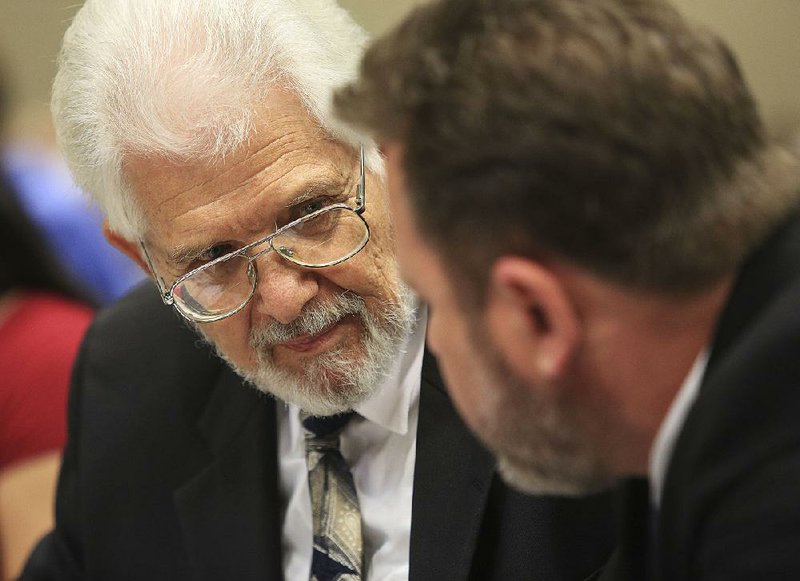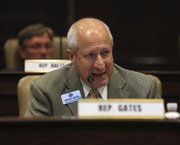Lawmakers told state social workers Thursday that they think the system used to investigate child abuse and maltreatment is broken.
State Sen. Alan Clark, R-Lonsdale, co-chairman of the legislative Joint Performance Review Committee, encouraged a number of parents who were investigated for child abuse to share their stories at the committee's Thursday hearing. Clark said he'd heard "horrifying" stories about the effect that false, anonymous allegations have had on parents.
Several parents testified that false allegations, made through the state's toll-free child abuse hotline, had hurt them emotionally and financially, threatening their livelihoods and tarnishing their reputations.
Clark and other lawmakers said they also were concerned because often only an investigator and a supervisor decide whether an allegation is true or false.
O̶n̶c̶e̶ ̶a̶ ̶"̶t̶r̶u̶e̶"̶ ̶f̶i̶n̶d̶i̶n̶g̶ ̶i̶s̶ ̶m̶a̶d̶e̶ ̶b̶y̶ ̶i̶n̶v̶e̶s̶t̶i̶g̶a̶t̶o̶r̶s̶,̶ ̶t̶h̶e̶ ̶a̶c̶c̶u̶s̶e̶d̶ ̶p̶e̶r̶s̶o̶n̶'̶s̶ ̶n̶a̶m̶e̶ ̶i̶s̶ ̶p̶u̶t̶ ̶o̶n̶ ̶t̶h̶e̶ ̶s̶t̶a̶t̶e̶'̶s̶ ̶c̶h̶i̶l̶d̶ ̶m̶a̶l̶t̶r̶e̶a̶t̶m̶e̶n̶t̶ ̶r̶e̶g̶i̶s̶t̶r̶y̶ ̶b̶e̶f̶o̶r̶e̶ ̶t̶h̶e̶ ̶p̶e̶r̶s̶o̶n̶ ̶c̶a̶n̶ ̶a̶p̶p̶e̶a̶l̶ ̶t̶h̶e̶ ̶f̶i̶n̶d̶i̶n̶g̶ ̶b̶e̶f̶o̶r̶e̶ ̶a̶n̶ ̶a̶d̶m̶i̶n̶i̶s̶t̶r̶a̶t̶i̶v̶e̶ ̶l̶a̶w̶ ̶j̶u̶d̶g̶e̶.*
"We must protect children ... but must we violate or skirt the Bill of Rights or the principles behind it to do so?" Clark said. "Unless we pass a constitutional amendment that says protecting children trumps all the rest of our rights, we must do our utmost to protect children while we ensure that our God-given rights are protected in the process."
The Department of Human Services oversees the maltreatment registry. People listed on the registry are ineligible for many jobs, such as in nursing or education, that involve working directly with children.
On Thursday, officials from DHS and the agency's Division of Child and Family Services said that call-takers, investigators, supervisors and others involved in investigating claims of neglect or abuse follow the law, as well as policies and procedures designed to protect children.
A part of that law, DHS spokesman Amy Webb said, forbids them from discussing individual cases.
To get their names removed from the registry, parents need to appeal investigators' "true" findings and win an argument before an administrative judge.
Rep. Mickey Gates, R-Hot Springs, said that roughly 45 percent of "true" findings that were appealed resulted in reversals of the findings. That figure, he said, indicates that the system is working against law-abiding parents and infringing on their rights to due process.
Witnesses, experts, lawmakers and even a DHS official testified that the child abuse hotline is often used as a tool during difficult divorce or child custody cases as a way of delaying the proceedings or getting back at former spouses.
During Thursday's meeting, several parents -- including Hal Stanley, a Baptist preacher and father of seven, from Hot Springs, shared their stories.
Stanley is appealing investigators' 21 "true" findings of abuse and neglect, including 12 counts of educational neglect and one allegation of burning a child.
Stanley and his attorney Joseph Churchwell said Thursday that the investigation was without merit and that Stanley has done nothing wrong.
In January, Stanley answered a knock on his door and discovered law enforcement officers and eventually an investigator from the Division of Children and Family Services. They were at his house to investigate complaints that there was a "noxious" chemical smell in the home, he said.
The seven children, some crying, were taken from the home, Stanley recounted. He said he and his wife learned that a caller to the hotline had accused them of several counts of child abuse.
The children were all returned to the Stanley home about four months later, and no criminal charges were filed against the parents.
Stanley said he used the Bible as a parenting guide, feeding his children only organic foods, forbidding inoculations and educating them at home.
When they returned, Stanley said, things were forever altered.
"They changed my children. They don't see the world like they used to," Stanley said. "I'm brokenhearted dealing with what's been broken by the system. ... The system needs to be changed. Parents are not guilty because someone calls in saying your children are running around outside with bare feet."
By state and federal statute, as well as DHS policy, state officials cannot discuss individual cases, department attorneys said.
During Thursday's hearing, Stanley and other parents -- whose children's privacy is protected by those laws -- waived the rights to privacy. They spoke openly about their experiences.
Several times during Thursday's meeting, discussions among lawmakers and DHS officials appeared to touch on specific cases, prompting DHS attorney David Sterling to remind them that they needed to be careful not to break privacy laws.
"I will be sure we're obeying the law," Clark said, adding that he had cleared his questions with attorneys. "I also want to find out who we're trying to protect" by not disclosing specific details.
Later Sterling said, "You ask the question about who we're trying to protect. We're trying to protect the laws that this legislative body, the Arkansas General Assembly, has put in place. You guys are the ones who passed these laws we're charged with carrying out, including protecting the privacy you're trying to put out on the table here. That's what we're trying to protect."
Stanley's "true" findings of neglect are pending before an administrative judge, and Stanley will have to show by a preponderance of the evidence that the allegations are false, before a judge can remove his name from the child maltreatment registry.
During a discussion of a father who lost his job with the state after his ex-wife reported a bruise that the father gave his daughter during a spanking -- a complaint that was found to be "true" by investigators -- Sen. Terry Rice, R-Waldron, said he was discouraged by what appeared to be a lack of responsiveness from state welfare officials.
"We go from one extreme, the first time ever bruise, and we can ruin his career," Rice told a DHS attorney. "I'm not mad at you. I'm mad at the system."
After Thursday's meeting, Webb said her agency would work with lawmakers to improve the state's laws but that the agency must honor its commitment to protecting children.
"It is also important to note that every day, unspeakable things happen to children in Arkansas, and we want to do everything we can to keep them safe," Webb said. "No child should have to endure physical abuse, sexual assault while they sleep in their homes or the many other things we sadly see."
Metro on 10/02/2015
*CORRECTION: A story in Friday’s edition about a state agency’s handling of child abuse allegations contained incorrect information about how a person's name is placed on the child maltreatment registry.
Under Arkansas Code 12-18-903, an offender’s name is placed on the registry if:
— an adult offender does not make a timely request for an administrative hearing;
— an underage offender or his parent or guardian waives an administrative hearing;
— an administrative law judge uphelds investigative findings pursuant to a preliminary administrative hearing;
— or, after completion of the administrative hearing process, the department's true finding is upheld.


